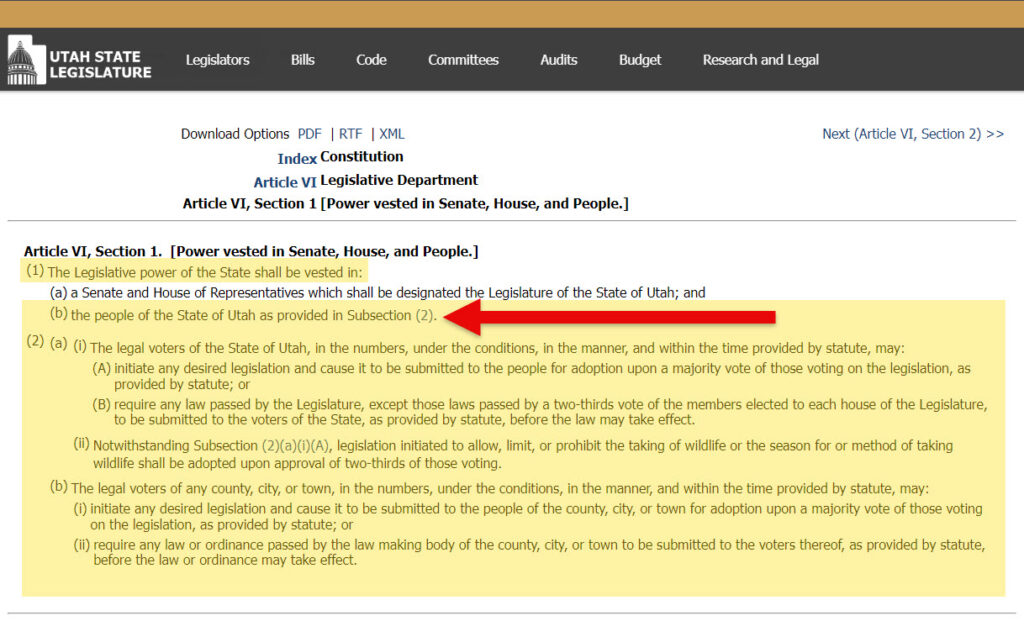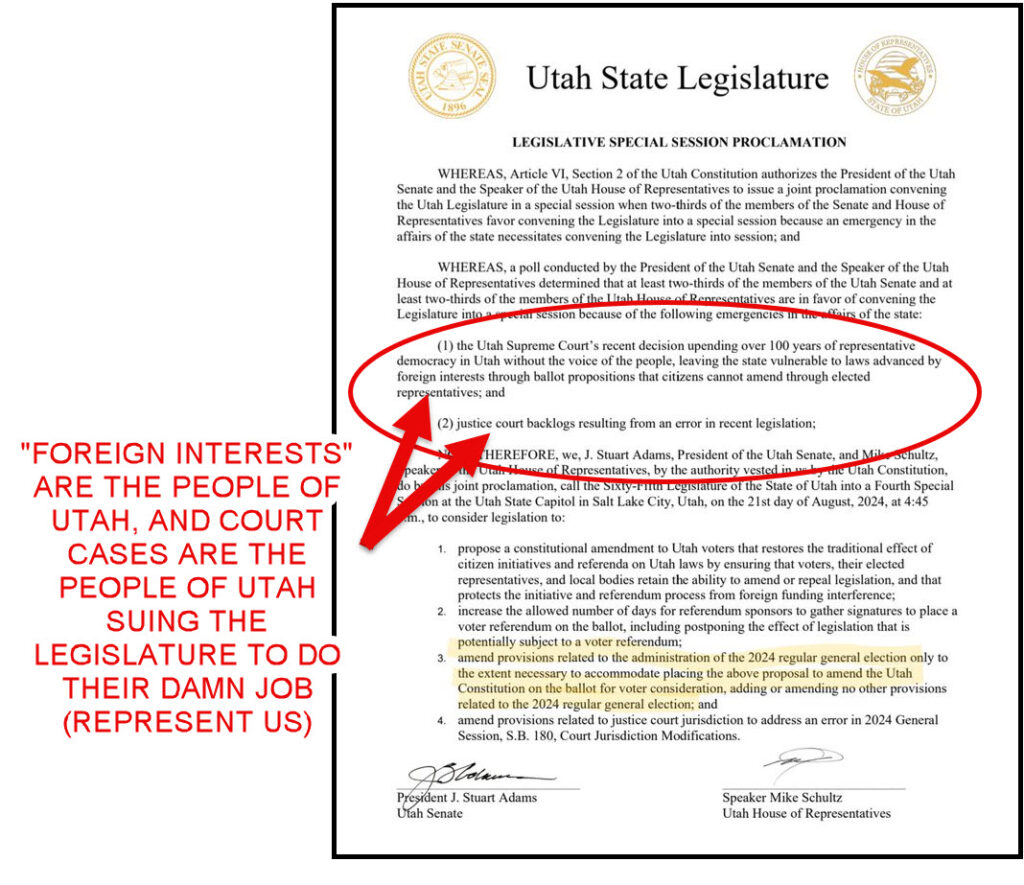PREFACE
On Saturday, September 28, Sen Lincoln Fillmore, Rep Susan Pulsipher, and Rep Jordan Teuscher held a townhall at Bingham Creek Library in West Jordan. The recording we captured is below, and starts at question #3 because we arrived late. I start with my own comments before linking audio, and leading into a summary of the discussion.
MY TOP PRIORITIES
My obvious first objective is to unseat Jordan Teuscher. Having said that, my top priorities for 2025 would be as follows, noting that in the past Utah’s General Session is 6 weeks of responding to bad ideas:
- Support redress following a court decision on LWV Utah v. Utah State Legislature by re-implementing the Independent Redistricting Commission, then implementing maps based on their recommendations before 2026 elections begin
- Address government overreach (citizen initiatives, defend constitutional checks and balances, private access to medical, first amendment)
- Address Prioritization of bills
- When infrastructure bills are seconded to who is allowed to use a bathroom, we have a problem. When books are banned in public schools, when phones are banned but guns aren’t, we have a problem
- When “good enough to get by” isn’t, we have a problem
- Support our public schools
- Support their funding, support the teachers, support the librarians to do their jobs.
- Improve cost and quality of living
- cost of living (rent/affordable homes), clean air, public access, transit, services
- infrastructure project funding and provisions
- address wait lists for disability programs (DSPD, Medically Complex Children’s Waiver, Assistive Technology)
AMENDMENT D
On Amendment D, the Utah Supreme Court said:
“The peoples’ right to alter or reform the government is constitutionally protected”
- There are no “superlaws”. There have never been any foreign interests introducing legislation through Citizen Initiatives into Utah
- The Utah Supreme Court noted that the Legislature cannot overturn or repeal an initiative without a compelling reason
- Utah is 2nd to Wyoming in the nation for restrictions on passing a citizens initiative
- In 2018 there were 3 ballot initiatives: Redistricting, Medicaid Expansion, Medical Marijuana. None of them were implemented as passed.
- There is a national trend in Republican states to make it harder to pass initiatives.
LWVU v. LEGISLATURE
“Therefore, we hold that when Utahns exercise their right to reform the government through a citizen initiative, their exercise of these rights is protected from government infringement. This means that government-reform initiatives are constitutionally protected from unfettered legislative amendment, repeal, or replacement. Although the Legislature has authority to amend or repeal statutes, it is well settled that legislative action cannot unduly infringe or restrain the exercise of constitutional rights. Consequently, when Utahns exercise their right to reform the government through an initiative, this limits the Legislature’s authority to amend or repeal the initiative. This does not mean that the Legislature cannot amend a government-reform initiative at all.Rather, legislative changes that facilitate or support the reform, or at least do not impair the reform enacted by the people, would not implicate the people’s rights under the Alter or Reform Clause. Legislative changes that do impair the reforms enacted by the people could also survive a constitutional challenge, if the Legislature shows that they were narrowly tailored to advance a compelling government interest.”
2024 BALLOT QUESTIONS
- County Proposal 8 – FOR – reauthorization of the 0.1% ZAP tax
- SLCO Bond $507M ($60/YR over 25 Years) – FOR
- Amendment A – voided by the Utah Supreme Court on October 9, 2024
- Amendment B – FOR – State School Fund from 4% to 5%
- Amendment C – AGAINST – County Sheriff elections (currently elected in the state, not necessary to enshrine in Utah Constitution)
- Amendment D – voided by the Utah Supreme Court on September 25, 2024
FEDERAL LANDS
I think my time in office is going to be better spent on helping constituents in a more direct way like mental health services, education, housing etc.
Responding to comments from Sen Lincoln Fillmore about reclaiming the 70% of federal lands in Utah:
- Does getting back the 70% mean they want to get rid of Utah tourism money to the National Parks? How do we pay for the management of the lands?
- Does the 70% figure also include military bases like Hill and Dugway? Are we getting rid of those too?
- How will we keep lands public and at the same time increase our tax base?
- How will Federal jobs be affected? What is the plan to help all the people affected?
- Where is the money to cover lost resources? Are we going to buy them or rent them back? Like the 31 engines and multiple firefighting helicopters from the BLM? https://www.blm.gov/programs/fire/regional-info/utah
TOWNHALL QUESTIONS (RECORDED)
Q3: On Citizen Initiatives
- Pulsipher – Legislative Process doesn’t mention appropriations and rules
- Audience comment: “open” is not truly open when a supermajority owns priority and calendar
- Fillmore – we’ve spent time on this, lets move on
- Teuscher – brings up Social Media bill, thinks its a high risk. Wasn’t there in 2018 for the passing of initiatives, but legislature “compromised” the bill after it was passed, same with medical marijuana
Q4: On Better Boundaries
There is no parity for Utahns with redistricting where districts became “safe for Republicans”, that disenfranchised voters
- Fillmore: who thinks that Prop4 Redistricting was going to be fair? Prop4 created the independent legislature, but no provision to adopt. Did the legislature following the intent of the voters? Fillmore scuttles the question
- Fillmore: Medical Marijuana would have legalized recreational marijuana
- Fillmore: REDIRECTS TOPIC – talks about Federal govt, Federal deficit, issue is 70% of land owned by Fed, no property tax, tries to tie this to education and property taxes.
What about Amendment A?
Audience comment: Federal Lands has nothing to do with Better Boundaries decision by Utah Supreme Court - Pulsipher: the legislature voted on it
Audience comment: The *Supermajority - Fillmore: We answered the question
- Pulsipher: something, something, “my reasons”
- Teuscher: go to your legislator, worked on Salt Lake County, it’s a puzzle, didn’t like that his street could have been split but acknowledges others are impacted in exactly the same way.
Q5: Why is there such a disconnect between citizen initiatives and the legislature? Why would the Citizen’s Initiative pass, then have such little relation to what the legislature passes?
- Pulsipher: In my years I have never had anyone approach to work with me beforehand (???) Why would she be approached if she won’t be friendly to the bill?
- Fillmore: power allocation; “Voters elect, have initiative and referendum power” Doesn’t mention that the Utah Constitution says that legislative power is shared with the legislature AND the people. Doesn’t mention the Utah Courts disagree with Legislative overreach.
- Fillmore: Federally, marijuana will likely reschedule in 2026 from schedule 1 to schedule 3 (note: marijuana has been available for several years as a prescription for epilepsy, it’s called Epidiolex)
Q6: Utah best qualities? Gov Cox says its the people of Utah
- Fillmore: culture, families, volunteerism, charitable giving, good state policies. Likes to think it’s the church’s influence. Legislative staff is non-partisan, works for both houses.
- Teuscher: Social capital. Good state processes, staff
- Pulsipher: balanced budget is constitutional
Q7: On Amendment A
Education account – wants it to be used for other purposes, why?
- Fillmore: voted to place it on ballot. The “problem” is income tax is growing, faster than population. General fund doesn’t have enough. Cut Medicaid or building roads, or public funds? (this is a lie) Gas tax, sales tax is shrinking.
- Pulsipher: 2008 downturn of economy, taxes down so education cut, income tax is volatile. If you lose your job you still have to buy food, pay property taxes, more stable. (another lie about instability driving the trust fund – the fund has grown from $18 million in 1983 to over $3.3 billion in 2024)
- Speaker: you’re changing the constitution, trying to open money to other spending
Q8: Venezuelan gang related shootings, suppressed in news, 100 ESL students in Jordan District schools that required the hire of additional staff, Utah as a sanctuary state, what are we doing about immigration?
Note: I’m sorry, but what?
- Teuscher: Thinks it’s an issue. Emailing for details with Jordan School District but they are only providing aggregated data due to privacy concerns.
- Audience comment: proud that we welcome immigrants who want to better their lives
Q9: Education: money going in vs audit of outcome?
- Fillmore: Auditor monitors performance, this is measured
- Audience comment: Graduation rate for Salt Lake County? (Jordan District was 88% – 2023) and more recent behavior problems in schools?
- Note of interest: vouchers weren’t mentioned, but are not audited once funds are distributed.
Q10: On Traffic
- Need infrastructure to accommodate growth, need East/West commute capacity
- Fillmore: Bangerter to remove lights, MVC will take longer
- Pulsipher: Bangerter is fast-tracked with extra money from COVID spending
- Teuscher: looking for expansions on Redline Trax, bus services (improvements in public transit). There are 2 lines in South Jordan, but no bus service in Herriman or Bluffdale






